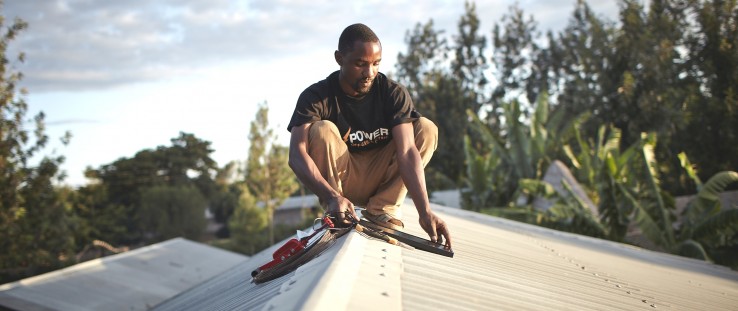 Employing a local salesforce, Off-Grid:Electric creates thousands of jobs in the countries where they operate. Here, a local employee installs a solar home system in Tanzania.
Matthieu Young
Employing a local salesforce, Off-Grid:Electric creates thousands of jobs in the countries where they operate. Here, a local employee installs a solar home system in Tanzania.
Matthieu Young
 Employing a local salesforce, Off-Grid:Electric creates thousands of jobs in the countries where they operate. Here, a local employee installs a solar home system in Tanzania.
Matthieu Young
Employing a local salesforce, Off-Grid:Electric creates thousands of jobs in the countries where they operate. Here, a local employee installs a solar home system in Tanzania.
Matthieu Young
Erica Mackey is a self-proclaimed “operations junkie.” She loves to bring structure to situations that others find challenging, which is why she has been so effective as the cofounder and chief operating officer of Off-Grid:Electric, an off-grid solar startup in Tanzania.
Mackey has been living and working in East Africa for more than 10 years, a place with just enough challenges—not to mention limitless potential—to enable her addiction.
A California native with a bachelor’s degree in ecology and evolutionary biology, Mackey moved to Tanzania after college with a desire to be effective in her new environment. She quickly learned Swahili and immersed herself in Tanzanian culture so she could best address some of the country’s health care gaps. Spending time rolling out mobile clinics and training rural health workers made her curious about what these communities believed were their biggest challenges to development. So she asked them.
Access to electricity topped their list.
This got Mackey thinking: Why is it that over a century after Thomas Edison powered his first light bulb, there are more people off the grid than on the grid? It seemed unfathomable to her that 1.6 billion people across the globe currently live without access to modern electricity. What was worse was that the world’s poorest people pay the most for the dirtiest energy—kerosene.
When Mackey first arrived in Tanzania, it was clear to her that there was an almost insatiable demand for clean, affordable and accessible modern energy. After six years in the field building non-profit operations, Mackey knew she needed to understand how to quickly grow a for-profit company to meet this demand. So she did what any operations junkie would do in this situation: She packed up and went to business school in 2010 for a one-year master’s program in business administration.
A Company Is Born
At Oxford University, Mackey met her business partner, Xavier Helgesen, a talented entrepreneur who was eager to start focusing his attention on energy in Africa. Mackey knew how to make ideas work there. The pair quickly brought in a third partner, Joshua Pierce, who knew something about building energy systems.
This is where Off-Grid:Electric came in. The company solves the same problems for customers that kerosene does, but in a way that gives them 50 times more light for less money and less risk. They also offer customers the ability to charge phones and power radios, TVs and other accessories.
Recognizing the potential of this innovation, Development Innovation Ventures, an innovation fund within USAID’s U.S. Global Development Lab that sources, tests and scales innovative solutions to global development challenges, provided a $100,000 seed grant to Off-Grid:Electric in 2013 to pilot its operations in Arusha, Tanzania.
“We’re proud to be an early and continued supporter of Off-Grid:Electric,” said Jill Boezwinkle, acting division chief of Development Innovation Ventures. “It has been exciting to work with such a talented and cutting-edge team that has developed Off-Grid:Electric from a small startup to a fast-growing company that is now scaling to bring affordable solar power to off-the-grid communities across Tanzania.”
Off-Grid: Electric uses mobile money, a local sales force and prepaid hardware to make solar affordable to everyone. The company is most differentiated by its business model—it approaches solar lights as services, not products, just as telecom companies do with cell phone. Rooftop panels are installed at a low cost to the customer. They pre-pay for the service in increments as small as a single day, with monthly rates as low as $5, much cheaper than the kerosene alternative.
Customers can opt to top-up their solar energy system in small amounts and pay through mobile money or through a local kiosk. They can call a 24/7 toll-free service line whenever they have a question or problem. Whether the customer requires a repair, replacement or upgrade, Off-Grid:Electric’s network of service agents provide in-home service at no cost.
This solar-as-a-service model reduces both the cost and the risk for low-income home owners to adopt solar energy and, as a result, demand exploded. Between 2013 and 2014, the number of homes receiving electricity from Off-Grid:Electric increased from 1,000 to nearly 30,000.
Not an Overnight Success
As Off-Grid:Electric shifted to its current solar leasing model, DIV helped support the fast-growing startup to reach its first 1,000 homes. Off-Grid:Electric was then able to leverage DIV’s initial investment to raise $7 million in private equity led by SolarCity, Vulcan Capital and Omidyar Network. After the company demonstrated both financial success and social impact, DIV invested another $1 million in late 2014.
Off-Grid:Electric also received $200,000 in funding in 2013 from the Overseas Private Investment Corporation’s U.S.-Africa Clean Energy Finance (ACEF) Program. ACEF support allowed Off-Grid:Electric to upgrade software, and optimize hardware design and supply chain management. These efforts were critical for the company to better serve its existing customer base while allowing it to scale quickly.
Off-Grid:Electric further developed a partnership with Power Africa—an initiative that brings together U.S. and African government leaders, the private sector and other partners to increase the number of people with access to power in sub-Saharan Africa—when it became a founding member of the Power Africa Beyond the Grid initiative in 2014.
As of March 2015, over 35,000 households in Tanzania were receiving electricity through Off-Grid:Electric. With another $16 million in equity financing from Solar City, Zouk Capital and Vulcan Capital as well as $7 million from the World Bank’s International Finance Corporation, Off-Grid: Electric expects to expand its current reach to connect 200,000 homes to affordable off-grid energy by the end of 2015.
“Because of USAID’s Development Innovation Ventures’ catalytic support, we were able to get here. We have raised millions in venture capital, putting our mission to light millions of African homes in the next decade into our sights,” said Mackey. “When people look back at this decade, they’ll remark that this is the period when Africa went solar. Powering Africa will enable a continent to communicate on charged mobile phones and computers. It will enable a continent to perform better in their studies because they can do their homework after the sun goes down, enabling a more productive and healthier society.”
Now Mackey and the rest of the Off-Grid:Electric team are thinking even bigger. In February, the company partnered with the Government of Tanzania in a commitment to bring affordable electricity to 1 million Tanzanian homes by 2017.







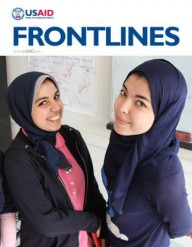

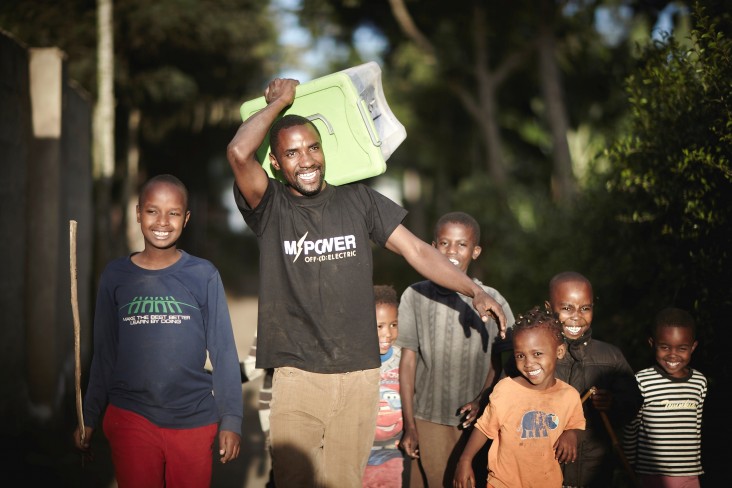
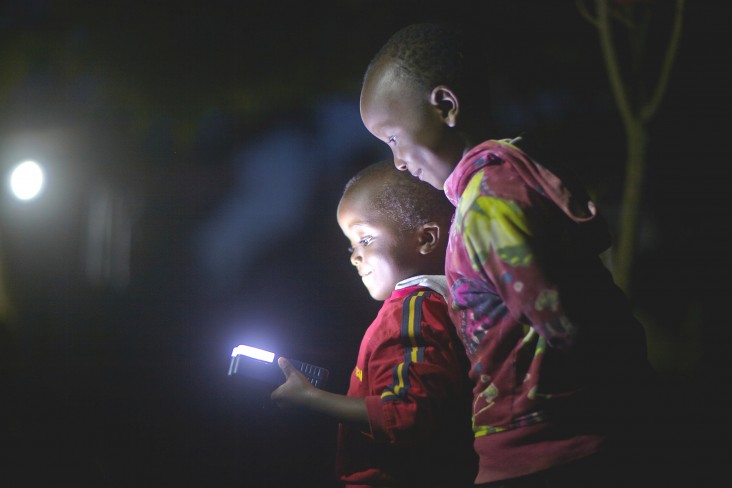
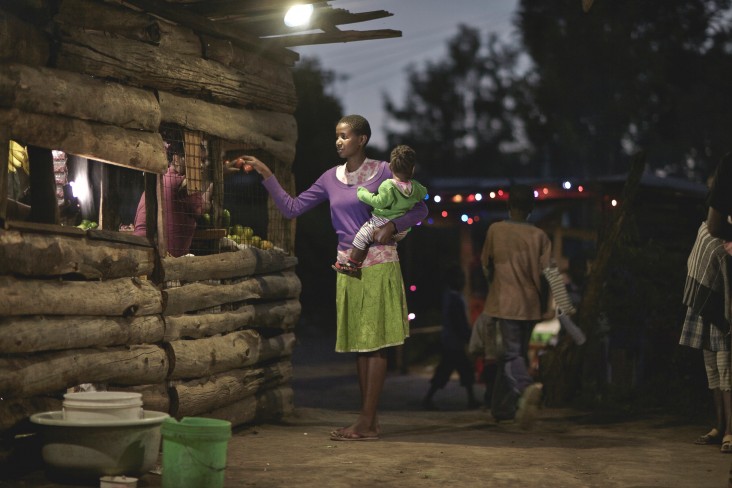
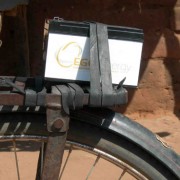
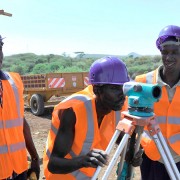
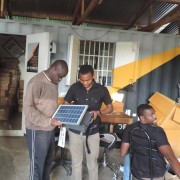
Comment
Make a general inquiry or suggest an improvement.